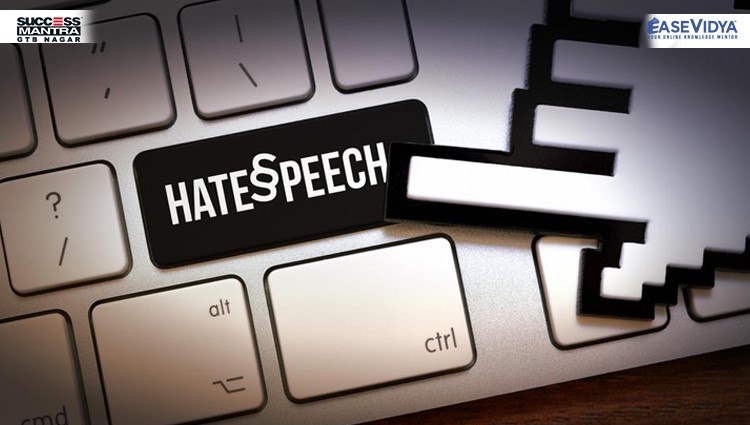
Hate Speech
Hate Speech
Context:
Rajya Sabha Chairman M. Venkaiah Naidu has said that hate speech should not be made against any community, be it minority or majority.
What’s the issue?
Concerns have been raised over concerted events in the recent past that targeted political, social and economic exclusion of Muslims through a series of rallies and hate speeches, Journalists too were attacked.
What is Hate Speech?
Hate speech is an incitement to hatred against a particular group of persons marginalized by their religious belief, sexual orientation, gender, and so on.
- The Law Commission, in its 267th report on hate speech, said such utterances have the potential to provoke individuals and society to commit acts of terrorism, genocide, and ethnic cleansing.
Why Hate Speech Must be curbed?
- Internal Security: The Muzaffarnagar riots of 2013 was triggered by a fake video that incited communal passions.
- Igniting extremist sentiments.
- Mob lynching.
- Misinformation and disinformation: Delhi Riots.
Measures:
- The world’s biggest social media companies, including Facebook, Google, Twitter and ByteDance, are exploring an industry-wide alliance to curb fake news on their platforms in India.
- The Election Commission of India must tie up with tech companies to identify the creator of such news.
- Educating the end-users.
- The government should bring out a policy framework on the possible harm due to the internet messaging platforms to engage at a deeper level.
- Imposing hefty fines, like in Germany the Social media companies face fines of up to €50m if they persistently fail to remove illegal content from their sites.
Need of the hour:
- Hate speech is a discursive process of pushing marginalised groups outside of social, economic and political spheres of society by disseminating hate propaganda and encouraging discrimination. At its most harmful, it is widely recognized as a precursor to ethnic cleansing.
- Public authorities must be held accountable for dereliction of the duty of care and also for non-compliance with this court’s orders by not taking action to prevent vigilante groups from inciting communal disharmony and spreading hate against citizens of the country and taking the laws into their own hands.
Provisions regarding Hate Speech:
Section 153A IPC penalises ‘promotion of enmity between different groups on grounds of religion, race, place of birth, residence, language, etc., and doing acts prejudicial to maintenance of harmony’.
Section 153B IPC penalises ‘imputations, assertions prejudicial to national-integration’.
Section 295A IPC penalises ‘deliberate and malicious acts, intended to outrage religious feelings of any class by insulting its religion or religious beliefs’.
Section 298 IPC penalises ‘uttering, words, etc., with deliberate intent to wound the religious feelings of any person’.
Section 505 IPC penalises publication or circulation of any statement, rumour or report causing public mischief and enmity, hatred or ill-will between classes.
Part VII of the Representation of People Act, 1951 classifies hate speech as an offence committed during elections into two categories: corrupt practices and electoral offences.
Various Committees and their Views:
T.K. Viswanathan Committee:
- It submitted a report recommending stricter laws to curb online hate speech and use of cyberspace to spread hatred and incitement.
- It proposed inserting Sections 153 C (b) and Section 505 A in the IPC for incitement to commit an offence on grounds of religion, race, caste or community, sex, gender identity, sexual orientation, place of birth, residence, language, disability or tribe.
Bezbaruah committee:
- It was constituted by the Centre in 2014 in the wake of a series of racial attacks on persons belonging to the northeast.
- It had proposed to insert two stricter anti-racial discrimination provisions in the IPC.












0 Comment